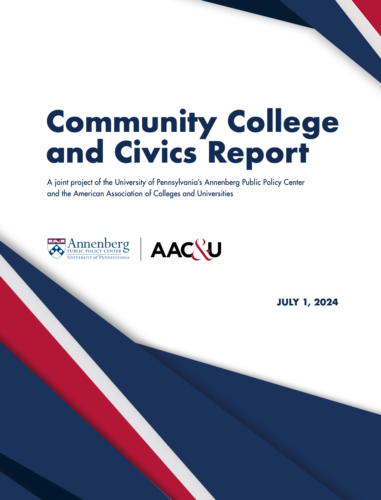While most civics education initiatives focus on students in primary and secondary schools, a new report examines the vital civic mission of community colleges, surveying the current state of civics education in these institutions and how it can be enhanced across the United States.
The new Community College and Civics Report, a collaboration of the Annenberg Public Policy Center (APPC) of the University of Pennsylvania and the American Association of Colleges and Universities (AAC&U), aims to understand how civics education opportunities are offered inside and outside community college classrooms and identify ways to strengthen and broaden these offerings.
 Nearly half of all college students receive all or part of their postsecondary education from community colleges, making these institutions a crucial focal point for understanding how higher education advances civic learning and community engagement.
Nearly half of all college students receive all or part of their postsecondary education from community colleges, making these institutions a crucial focal point for understanding how higher education advances civic learning and community engagement.
The report is based on a survey of institutional leaders at 145 U.S. community colleges located in 42 states and was conducted June 16-August 11, 2023. The respondents included community college presidents, provosts, vice presidents of academic affairs, directors, and faculty members.
“This report offers a window into the wealth of opportunities community colleges can offer for the advancement of civic education,” said R. Lance Holbert, director of the Leonore Annenberg Institute for Civics (LAIC) at the Annenberg Public Policy Center. “Civics needs to be a core focus of all academic institutions, and this report reveals how community colleges are playing their part to develop a knowledgeable, engaged citizenry.”
“With a presidential election on the horizon, there is no better time to be reminded of the many ways every institution of higher education contributes to a thriving democracy,” said Lynn Pasquerella, president of AAC&U. “This report demonstrates how community colleges continue to be at the forefront of these civic efforts as foundational anchors within the communities they serve.”
Key findings
Among the report’s findings:
- 72% of respondents indicate that their community college offers courses across the curriculum that include civic learning. However, only 18% say these courses are specifically designated as “civic learning.”
- Just a quarter of respondents (26%) say U.S. history is required, and fewer say that students are required to take courses such as American government and politics (20%), the U.S. Constitution (10%), or understanding civic institutions (14%).
- Nearly all of the respondents (92%) say that their community college offers community-based engagement experiences (such as service learning, internships, community-based research, and clinical fieldwork) within the curriculum.
- Nearly three in four respondents (72%) indicate their community college offers co-curricular community-based engagement experiences, such as community volunteering opportunities (on- and off-campus), student government, student clubs and organizations, internships in local, state, or federal government, and internships with local businesses or non-profit organizations.
- Nearly a third (32%) of respondents say their community college offers professional development programs for faculty and staff aimed at integrating civic learning and community-based engagement experiences into curricula.
The survey and report also find that a lack of resources – funding – is a clear inhibitor to the further advancement of civics education initiatives for community colleges. Additional resources are needed for faculty training, the development of new curricular and co-curricular initiatives, and the establishment of civics education centers.
The Community College and Civics Report was co-written by Ken Winneg, APPC’s managing director of survey research, and Ashley Finley, vice president for research and senior advisor to the president of AAC&U. Winneg directed the survey and analyzed the findings. The project was initiated by APPC director Kathleen Hall Jamieson and supervised by R. Lance Holbert, director of the Leonore Annenberg Institute for Civics at APPC.
The Annenberg Public Policy Center (APPC) was established in 1993 to educate the public and policy makers about communication’s role in advancing public understanding of political, science, and health issues at the local, state, and federal levels. Its Leonore Annenberg Institute for Civics (LAIC) was endowed in 2008 to honor Ambassador Leonore Annenberg’s lifelong commitment to public service and civics education. LAIC is dedicated to the creation of high-quality civics education resources for diverse audiences, including K-16 students and teachers and the public. Its signature programs are Annenberg Classroom, an online resource that provides award-winning videos, games, books, and lesson plans on the U.S. Constitution, and the Civics Renewal Network (CRN), a partnership of over 40 nonpartisan, nonprofit organizations dedicated to providing no-cost, high-quality civics education resources.
The American Association of Colleges and Universities (AAC&U) is a global membership organization dedicated to advancing the vitality and democratic purposes of undergraduate liberal education. Through our programs and events, publications and research, public advocacy and campus-based projects, AAC&U serves as a catalyst and facilitator for innovations that improve educational quality and equity and that support the success of all students. In addition to accredited public and private, two-year and four-year colleges and universities and state higher education systems and agencies throughout the United States, our membership includes degree-granting higher education institutions in more than twenty-five countries as well as other organizations and individuals. To learn more, visit www.aacu.org.

